When you think of Theater what do you think of? A stage? Elaborate costumes? Actors? Shakespeare? Probably all of the above. When Theater is talked about, one essential aspect is often overlooked: The stage crew.
There are so many jobs on the crew and each crew member has different roles. For example the stage manager can also be part of the running crew. And someone on the prop crew can help with makeup. There are a lot of overlaps in the world of theater. Crew does a lot of different jobs and wears a lot of different hats but they are very essential to the theater and help make the show what it is.
For example during this year’s Waltham High School Senior Revue there was a lot going on behind the scenes. During a show such as the annual Senior Revue production crew controls lighting above the stage, and on stage changing the colors of the shins (the lights on either side of the stage). Crew also controls the rigging and makes sure that soloists have their mics. The crew does so many things before, during and after the show.
“I love that I will give a list of stuff, here’s what needs to happen, and all of a sudden it just happens and it’s just like what I say time and time again ‘the magic’ and the crew are such unsung heroes,” said Waltham High School theater teacher Ms. Jesse Bastarache. “They’re not on stage, they’re not coming out and taking a big bow, and there’s so much stuff that, as the audience is watching, they have no idea that those things are so carefully planned and so carefully executed and that everyone backstage is doing five hundred different things at once. It is such a hard job but it looks so effortless.”
Crew is so essential to the theater. Every show big or small needs a crew and Ms. Bastarache argues that there would be no shows without a crew. “Oh my goodness it just couldn’t happen without them. Again, they are unsung heroes. It’s where the magic happens,” said Bastarache. “An actor can come onstage and act and do an amazing job but without the lighting and the scenery and the costumes and the people moving things backstage and all the things going on it just wouldn’t be the same. There wouldn’t be that magic. So they are essential.”
More students are taking a class where you learn about the stage and crew. Ms. Bastarche who teaches the class at WHS said, “stagecraft class is all things from learning how to design scenery, to learning about the lighting, to costuming and makeup and then actually putting those things into action and building our scenery for the shows and helping with whatever is going on in the auditorium.” Stagecraft is a very hands-on class and students do many physical projects, such as set design and building. They do many different projects and it is a good introduction if you are curious about the crew.
“What’s funny is, particularly with our stagecraft class, the first year our stagecraft class was teeny teeny tiny, and then the next year it was a little bigger, and then the next year it was a little bigger, and then this year we have three sections of it. And it’s insane to me how big the program has gotten, that it rivals the amount of acting classes that I have. It’s just so cool and so wonderful that so many kids are interested in this aspect of theater.” says Bastarache, “And also you’re more likely to find a job in technical theater than you are in performing, especially if you have a certain skill, especially if you’re really good at lighting, or if you’re good at electronics. There’s so many crossovers between tech theater and other skills that I think people don’t really think about so it’s a way to put two things that you’re passionate about together. And so I love that little by little people are figuring that out, students are figuring that out, that this could be a career path for them and I think that’s super important.”
Freshman Anya Hersh loves stagecraft class and thinks that it’s already taught her a lot. “Theater building and teching and crew is not carpentry, it’s not fixing someone’s chair. I went into stagecraft and doing all this building thinking I need to be very precise with these paint lines and I have to do this and I have to do that.” says Hersh, “But one of the best things I’ve learned from this class is that it doesn’t need to be perfect and that it’s so different from building things outside of the class. You can’t treat it like everything needs to be perfect, it’s just a whole different world.”
To learn more about different theater jobs and the theater hierarchy click here on these amazing slides from Ms. Bastarache: THEATER JOBS
Here are some of the roles in these slides. These roles include (but are not limited to):
- Stage manager – The stage manager is the head of the crew. This person keeps all the ducks in a row and is also responsible for managing some elements of the show. They act as the right hand to the director.
- Running crew – The running crew supervises and runs technical aspects of the show during the show. This can include moving set pieces on and off stage, sweeping the stage during intermission and before performances among other things.
- Prop Crew – The prop crew makes sure that all props get to their actors. They are responsible for acquiring or building these props in most cases, and maintaining them. They have to make sure that these props are all accounted for and put in the right place.
- Sound designer – This person is in charge of the sound for the show whether it be controlling the mics or playing pre-recorded sound or music.
- Lighting designer – This person is in charge of the lighting for the show. They tend to write up the lighting cues with the director and are in charge of the lighting crew.
- Lighting crew – The lighting crew operates the light during shows. They make sure the actor has their light and control all the spotlights you see in a show.
- Set designer – The creator of the scenery for the theatrical production.
- Costume designer – Plan and supervise the creation of costumes worn by the actors in a theatrical production.
- Hair designer – Styles the hair and oversees the hair designing process for an actor during a theatrical production
- Make up designer – Often is the same person as the hair designer. Designs and oversees the application of the makeup on actors in a theatrical production.
“My favorite thing about the crew is that they help create an environment that enhances the dancing and the singing and brings more emotion to the show,” said Waltham High Choir Director Mrs. Cincotta. “And personally I love the idea of the crew. That they are people that add so much to the show yet they never go on stage. So they have such a different, but powerful, impact than the singers, dancers, or instrumentalists have.”
“I love the collaboration. We say one thing and all of a sudden everybody’s pitching ideas and we’re coming up with different ways to do things,” said Bastarache. “Especially since starting to teach here at the high school, it’s like I have this idea, but I’m not quite sure, and then just talking to my students about it all of a sudden we come up with some brilliant, cool, amazing idea that I would never have thought of on my own. So I love that aspect of it.”
For me, doing crew is a very educational experience. In middle school beginning in seventh grade I did the crew for four productions. For two I was an assistant stage manager, which probably wasn’t that great of an idea because I had never been on a crew before, yet alone as a stage manager. The next two I was the head stage manager. In that year between the first and the third productions I certainly learned a lot about theater. I learned many new terms and I was really surprised at how much the crew did. I began to appreciate how important the crew was. As a stage manager I continued to learn from the director and even from my assistant stage managers.
Now I learn even more about technical theater and the crew in stagecraft. Every class I learn how to do new things I never knew how to do before. There’s always a project and I think it is a very good introduction to technical theater and the world of the crew. We’ve done all sorts of projects from painting, to loading things in through the loading dock, to hanging up lights.
I think doing crew is a very fun and educational experience because you learn so much while still having a good time. Three years ago I had no idea what “The deck is set” meant or what “The Shins” were (and you’ll just have to join the crew to find out). But in these last couple of years I’ve learned and grown. I continue to do crew to continue to learn more. Every day I’m on crew I always learn something new whether it be from the directors, my fellow crew members, or from the actors.
Crew is also a big safety aspect of the theater. There are a lot of things in the theater that can be dangerous if not handled correctly. From tools, to lights, to rigging many things can be potentially lethal. The crew is well trained to handle these things safely and properly. “There’s a whole safety component of having an organized crew because within a full show like a musical or a play there is a lot of moving of equipment that honestly actors or dancers or instrumentalists are sometimes unaware of,” said Cincotta.
I think it is also a team building experience and it helps you learn to work with others. No crew can work with just one person, which I think is something I came to forget when I got my job as senior stage manager at McDevitt Middle School. Each person on the crew has their own unique role and contributes to the show in their own way.
A crew needs all their pieces. They need a stage manager, they need running crew, they need lighting crew. They need people who can work with others and people who can focus and lock in on the task at hand. They need people who can help each other and who don’t give up.
“I do think there’s a strength in numbers. But also, especially when you are moving equipment, more isn’t always more because if you have people who are just kind of in the way or don’t know what they’re doing it actually becomes a hazard,” said Cincotta. “So I think we have a good mix of people who are working hard, are knowledgeable on how to navigate our set and navigate the spaces while also not being too many that it’s just too many cooks in the kitchen.”
The crew does have some requirements one being that you need to be helpful. You can’t just stand there and get a free backstage pass. You have to contribute and help with the tasks at hand. You have to have work ethic and team working skills. You also have to have problem solving skills. These aspects are essential for the crew and help create a strong team. Being on the crew can sometimes be a stressful activity. But if you have the right crew members who work together, treat each other kindly, and can problem solve, then the crew is a very fun and interesting job.
Crew introduces you to a potential career path in the future. Broadway productions need stage crew for every production and there are always more local theaters in need of crew. Stage crew can also be taken to a larger scale. Not only is stage crew a thing in theater, it is also a thing in the world of music. Yeah that’s right, artists like Taylor Swift and Harry Styles need stage crew too. There are also some crew jobs in movies, these jobs being called Film Crew. These consist of things like makeup designers, set designers, and more.
Crew is an essential part of theater. Without the crew, plays and musicals are a lot less organized or high tech. Crew moves set pieces on and off the stage, the crew is responsible for props, the crew helps with costume changes, the crew does lighting, and so much more. Otherwise the cast would have to do it all themselves on top of acting, singing, and dancing.
“They’re just so helpful. When you’re on the crew you’re choosing actively not to be in the spotlight. You’re choosing to do the dirty work, the hard work of putting on this production to make the audience happy, to make the actors happy,” said Hersh, “I respect the heck out of any crew I will perform with because we are performing with them. They are a massive part of the production. It’s as stressful as performing in my opinion, and I’ve done both, because there’s so much quick thinking and long term thinking that goes into it. There’s so much configuration of where things are on stage. It’s a lot.”
The crew is definitely a big help for the play especially during tech week. Tech week is where the crew gets to shine. It is also where the flaws and errors of a show are fixed. Tech week is the week leading up to a show. All the technical elements are added and used simultaneously. The show really comes together in that week and crew is essential. This week is when the crew gets to do their jobs and really learn them to the best of their ability. It greatly prepares not just the crew but the cast too for the shows.
But the crew is also very challenging. There are a lot of different and complex aspects of the job and juggling them all at once can be difficult. An anonymous crew member said that, “I guess the most challenging part of the crew is the stop and start nature of it. It’s like go go go Stop.” This can be challenging as the work is sometimes unexpected and rushed or there is sometimes a lot of waiting around and having to have patience. Mrs. Cincotta agrees that crew can be challenging and says that, “Things are sometimes more complicated than you realize.” Never were there more true words spoken. More often than not a task is more complicated than you would think or more complicated than it needs to be. There are a lot of key aspects to each project and if not all of them are done correctly then things can go wrong.
However, the crew doesn’t always get the recognition they deserve. “It’s less showy,” Cincotta says, “because when you watch the stage you see the people singing and dancing but people sometimes don’t realize someone has to do that. Someone executed all of that. It can be less obvious.”However, some crew members think that the actors can sometimes not appreciate the crew. An anonymous crew member thinks that there are just a lot of people who boss the crew around and think the crew is just there to help them. And while the crew is there to help people they do have their jobs and can’t bend to the will of anyone.
But Mrs. Cincotta thinks that it isn’t so much being unappreciative than it is obliviousness. When you are doing your own job whether it be on the crew or as an actor people can be oblivious to the things going on around them. There’s so much going on and a lot of people tend to focus on their job so much that the world around them just goes blurry and is shrouded in shadows. They don’t see how much the other people are doing and they don’t see how important these jobs are.
Anya Hersh agrees and thinks that the crew doesn’t get appreciated like they should. She thinks the crew needs more recognition, “It needs to be normalized and known that when you are clapping for a performance you are clapping for every single person who helped put on that performance.” She also thinks that it isn’t necessarily the audience’s fault but the crew does get a little forgotten. “I think the whole out of sight, out of mind thing is very prevalent in just humans in general. If you’re looking on stage, you aren’t looking at the people backstage running props, and costumes, and configuring the risers and this and that” Hersh says, “You’re not seeing that so it’s way harder for people to appreciate that. I think theater can be so immersive and so mesmerizing that you just completely forget about everything else that’s going on so it’s hard to see them behind the scenes. It’s hard to remember they’re there, but without them there wouldn’t be everything you’re seeing on stage.”
Crew can sometimes feel like an unappreciated job however but the theater department is striving to make the crew a more glorified and appreciated job. “It’s been my goal and I know with Lori Baruch, our head of tech, and Deb Finell, our dance teacher, we try really hard to make sure that everybody sees what everyone else is doing and I think in the last couple of years our performers are super appreciative of the crew.” Bastarache said “I think that we are getting to the point, especially in Waltham, where we recognize that it’s a collaborative effort. It doesn’t matter if you’re the star of the show or if you’re backstage moving a set piece who no one ever sees. Everybody is equally important and that’s kind of one of my primary focuses in teaching theater is that nobody is more important than anybody else. That in order to make it happen everybody has their part and that’s why theater is so fun.”
Crew is an experience that you can take with you throughout your whole life whether you make it a career or not. You can learn skills that can help with construction, carpentry, and painting among other things. The team building skills you learn can be applied to working in groups at schools along with working with others at your job. It can also just be fun to watch a movie, show, play, or musical and to understand how it is working and say “Hey I did something like that before”.
“It doesn’t matter who you are: to crew, to actors, to directors, to stage managers, whoever, the theater is a safe space for all of those people. It doesn’t matter who you are so I feel like the biggest issue in theater is people being too full of themselves and people believing that everyones there to see them.” Hersh said, “We all just need to chill and realize that not everyone is. You are not the one everyone is here to see. Everyones a part of it and everyone sees this space the same way you do, and everyone deserves the same recognition.”
The crew is a very challenging, fun, and educational job and is an essential piece of the puzzle of Theater. If this interests you, I would recommend taking Stagecraft first and then, if you are still interested, join us in the shadows of theater.
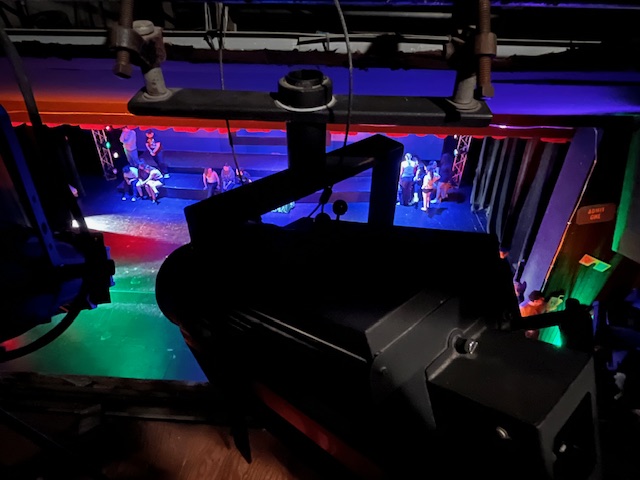
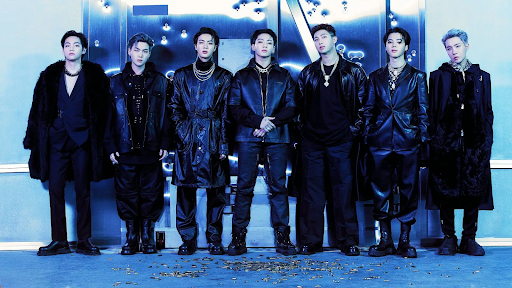
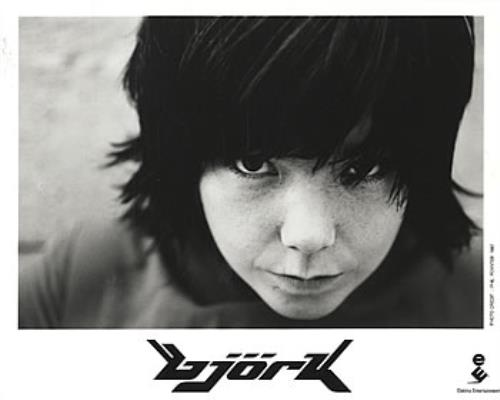
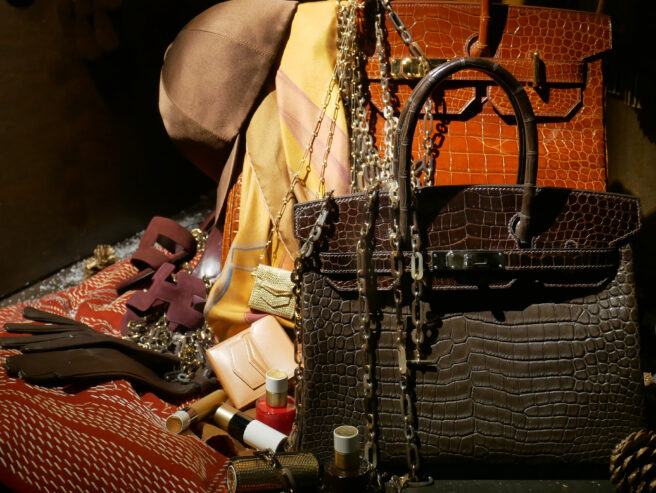




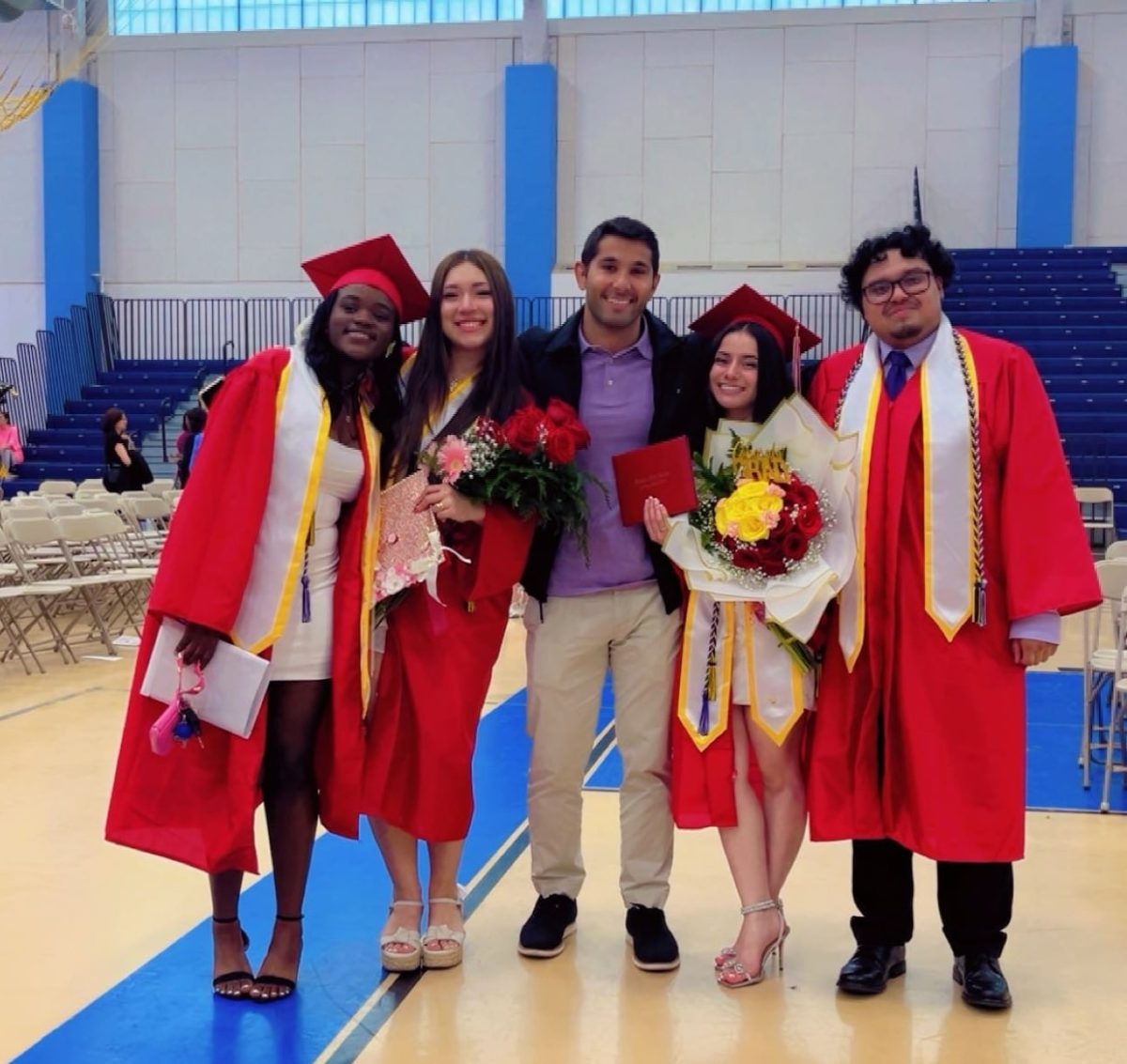

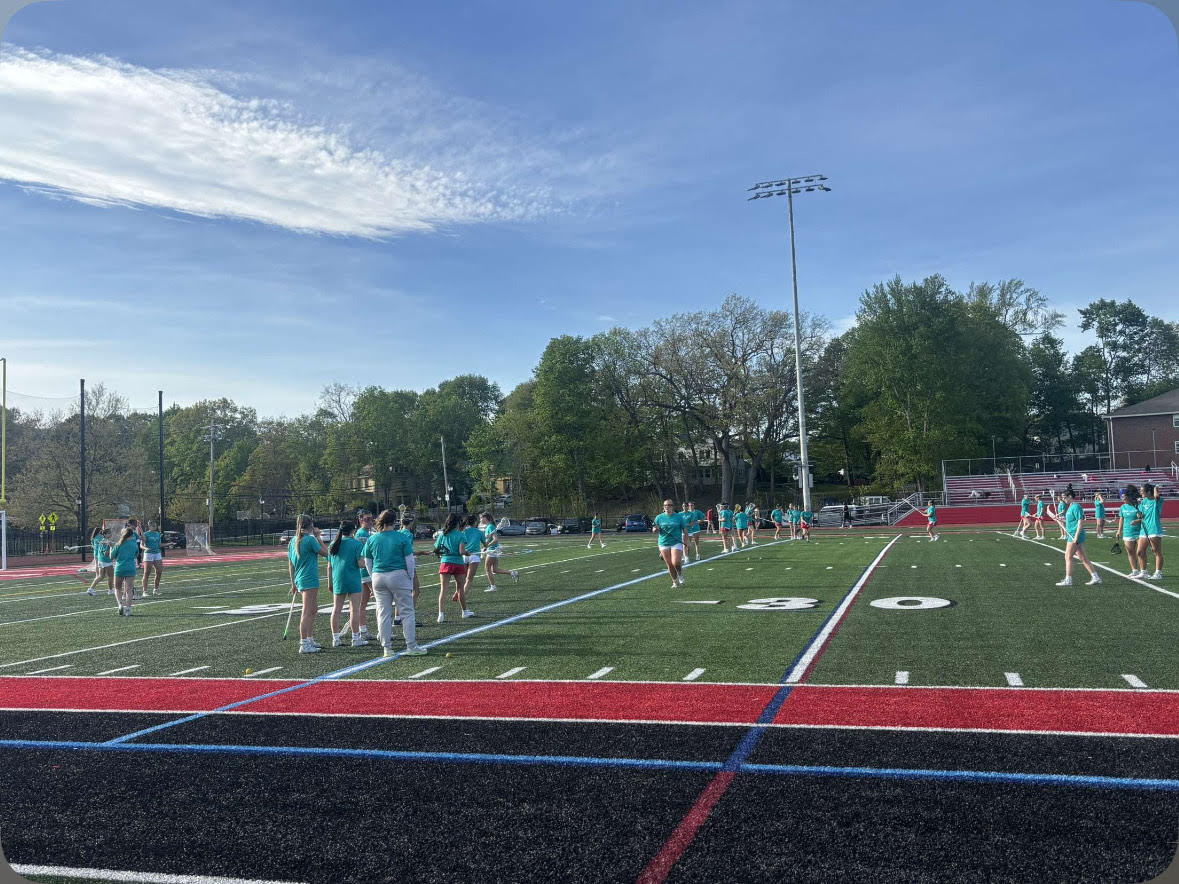
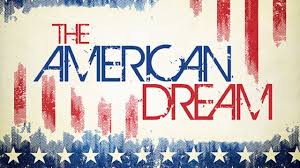

Jesse Bastarache • May 1, 2024 at 11:43 am
This is such an amazing article Justin! Thank you for interviewing me – love being able to talk about how much I love Tech Theater and our Crew!
WalthamHawk • Apr 29, 2024 at 6:04 pm
What a wonderful sentiment. This story really expresses a new light into what happens behind the scenes of our school productions. I never thought of it like this before, but the stage crew are the real stars of the show!